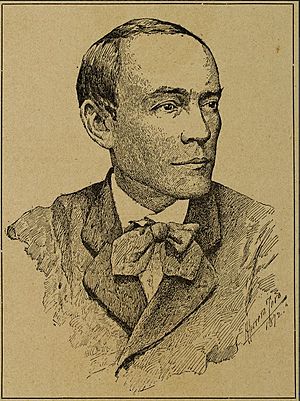Cecilio Acosta facts for kids
Quick facts for kids
Cecilio Acosta Revete
|
|
|---|---|

Cecilio Acosta by Antonio Herrera Toro
|
|
| Born | 1 February 1818 San Diego de Los Altos, Miranda, United States of Venezuela
|
| Died | 8 July 1881 (aged 63) Caracas, Venezuela
|
| Resting place | National Pantheon of Venezuela |
| Nationality | |
| Era | XIX century |
| Known for | Writer, journalist, lawyer, professor |
| Political party | Liberal |
Cecilio Juan Ramón del Carmen Acosta Revete (born February 1, 1818 – died July 8, 1881) was an important Venezuelan writer, journalist, lawyer, and thinker. He was known for his many talents and his strong beliefs.
Contents
Life and Career
Cecilio Acosta was born in 1818 in a small village called San Diego de los Altos. His parents were Ignacio Acosta and Juana Margarita Revete Martínez. A priest named Mariano Fernández Fortique, who later became a bishop, helped teach him when he was young.
In 1831, Cecilio began studying to become a priest in Caracas. However, in 1840, he decided to leave the seminary. He then studied mathematics and became a surveyor. Later, he went to the Central University of Venezuela to study philosophy and law, eventually becoming a lawyer.
Around 1846 and 1847, Cecilio started writing essays for newspapers like La Epoca and El Centinela de la Patria. He wrote about many topics, including politics, economics, society, and education. He also wrote poetry.
Cecilio Acosta is remembered as one of Venezuela's most important thinkers of the 19th century. People admired his deep knowledge in areas like law, history, and language. He also stood up against unfair rulers and strong leaders.
He was a liberal politician, meaning he believed in more freedom and rights for people. He faced difficulties under the rule of the military leader Antonio Guzmán Blanco. Cecilio Acosta died on July 8, 1881.
Since 1937, his remains have been kept in the National Pantheon of Venezuela. This is a special place where important Venezuelan heroes are honored.
The famous Cuban writer José Martí met Cecilio Acosta shortly before he died. Martí wrote about Acosta, saying he was a very kind and wise person. He believed Acosta cared deeply about others and always tried to do good.
Cecilio Acosta is still a very important figure in Venezuela. For example, his death was remembered in 1981, alongside celebrations for other great Venezuelans like Andrés Bello and Simón Bolívar.
Honors
- The Catholic University Cecilio Acosta in Maracaibo was named after him. This private university was founded in 1983.
His Ideas and Works
Cecilio Acosta wrote about many different subjects. These included politics, law, economics, history, and literature. He also wrote poems and letters.
He strongly believed that Venezuela's education system needed to change. He wanted to modernize it and add new subjects. He also thought that practical skills and workshops were very important for the country's progress. He called this the "true lord of a new civilization."
Some of his well-known writings include:
- “Reforma de las Leyes II y III del Código de Instrucción Pública (1847) (Reform of Laws II and III of the Public Instruction Code)
- “Cosas sabidas y Cosas por saberse” (1856) (Known Things and Things to Know)
- “Revista de Europa y de los Estados Unidos de Norteamérica” (1879) (Review of Europe and the United States of North America)
- Charity or fruits of the cooperation of all to the well of all (1855)
- Studies of International Law (published in 1917)
- Influence of the historical-political elements in the dramatic literature and in the novel (published after his death in 1887)
- Complete works (published in five volumes between 1908 and 1909)
See also
 In Spanish: Cecilio Acosta para niños
In Spanish: Cecilio Acosta para niños
 | James Van Der Zee |
 | Alma Thomas |
 | Ellis Wilson |
 | Margaret Taylor-Burroughs |

